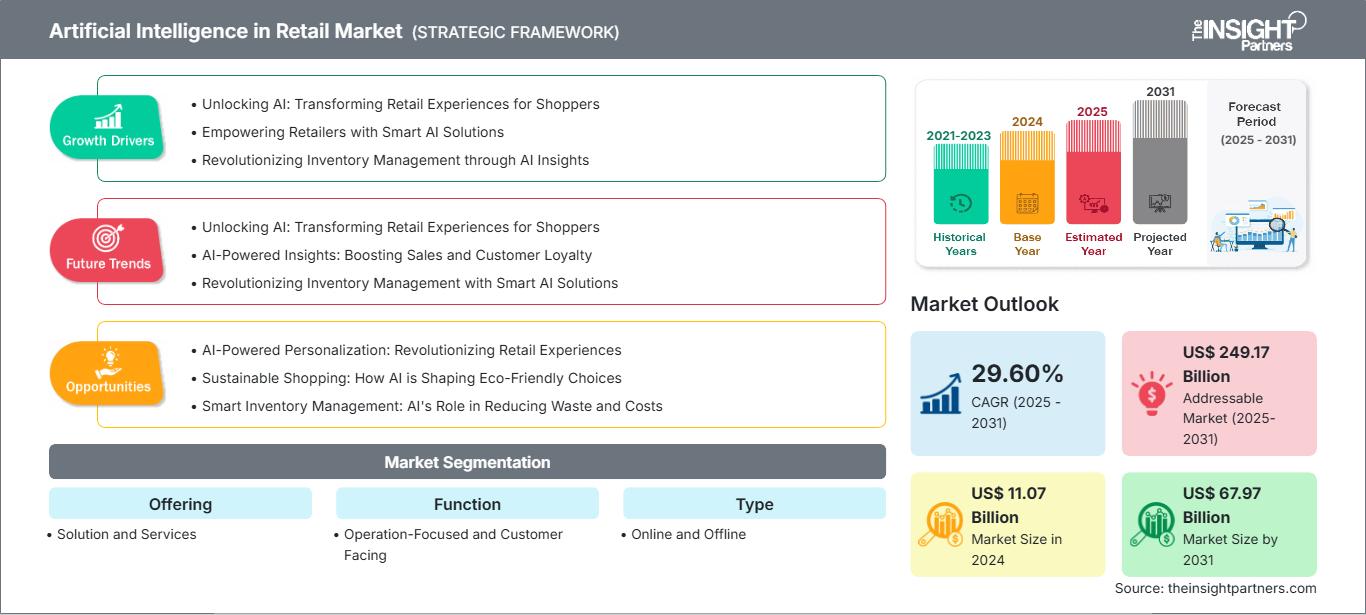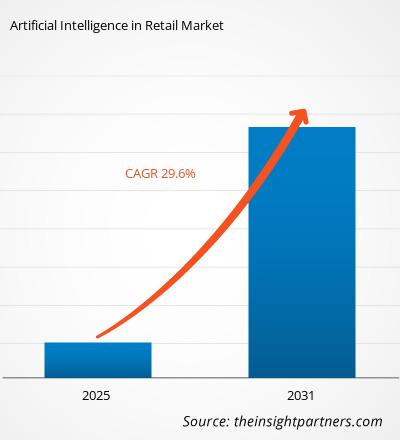Artificial Intelligence in Retail Market Size, Share, and Growth by 2031
Artificial Intelligence in Retail Market Size and Forecasts (2021 - 2031), Global and Regional Share, Trends, and Growth Opportunity Analysis Report Coverage: By Offering (Solution and Services), Function (Operation-Focused and Customer Facing), Type (Online and Offline), Application (Predictive Analysis, In-Store Visual Monitoring & Surveillance, Customer Relationship Management, Market Forecasting, Inventory Management, and Others)
Historic Data: 2021-2023 | Base Year: 2024 | Forecast Period: 2025-2031- Report Date : Apr 2026
- Report Code : TIPTE100000703
- Category : Technology, Media and Telecommunications
- Status : Upcoming
- Available Report Formats :


- No. of Pages : 170
The Artificial Intelligence In Retail Market size is expected to reach US$ 86.26 Billion by 2031. The market is anticipated to register a CAGR of 24.4% during 2025-2031.
The report is categorized by Offering (Solution and Services) and further analyzes the market based on Function (Operation-Focused and Customer Facing). It also examines the market by Type (Online and Offline) and Industry Application (Predictive Analysis, In-Store Visual Monitoring & Surveillance, Customer Relationship Management, Market Forecasting, Inventory Management). A comprehensive breakdown is provided at global, regional, and country levels for each of these key segments.
The report includes market size and forecasts across all segments, presenting values in USD. It also delivers key statistics on the current market status of leading players, along with insights into prevailing market trends and emerging opportunities.
Purpose of the Report
The report Artificial Intelligence in Retail Market by The Insight Partners aims to describe the present landscape and future growth, top driving factors, challenges, and opportunities. This will provide insights to various business stakeholders, such as:
- Technology Providers/Manufacturers: To understand the evolving market dynamics and know the potential growth opportunities, enabling them to make informed strategic decisions.
- Investors: To conduct a comprehensive trend analysis regarding the market growth rate, market financial projections, and opportunities that exist across the value chain.
- Regulatory bodies: To regulate policies and police activities in the market with the aim of minimizing abuse, preserving investor trust and confidence, and upholding the integrity and stability of the market.
Artificial Intelligence in Retail Market Segmentation Offering
- Solution and Services
Function
- Operation-Focused and Customer Facing
Type
- Online and Offline
Application
- Predictive Analysis
- In-Store Visual Monitoring & Surveillance
- Customer Relationship Management
- Market Forecasting
- Inventory Management
Customize This Report To Suit Your Requirement
Get FREE CUSTOMIZATIONArtificial Intelligence in Retail Market: Strategic Insights

-
Get Top Key Market Trends of this report.This FREE sample will include data analysis, ranging from market trends to estimates and forecasts.
Artificial Intelligence in Retail Market Growth Drivers
- Unlocking AI: Transforming Retail Experiences for Shoppers
- Empowering Retailers with Smart AI Solutions
- Revolutionizing Inventory Management through AI Insights
Artificial Intelligence in Retail Market Future Trends
- Unlocking AI: Transforming Retail Experiences for Shoppers
- AI-Powered Insights: Boosting Sales and Customer Loyalty
- Revolutionizing Inventory Management with Smart AI Solutions
Artificial Intelligence in Retail Market Opportunities
- AI-Powered Personalization: Revolutionizing Retail Experiences
- Sustainable Shopping: How AI is Shaping Eco-Friendly Choices
- Smart Inventory Management: AI's Role in Reducing Waste and Costs
Artificial Intelligence in Retail
Artificial Intelligence in Retail Market Regional InsightsThe regional trends influencing the Artificial Intelligence in Retail Market have been analyzed across key geographies.
Artificial Intelligence in Retail Market Report Scope
| Report Attribute | Details |
|---|---|
| Market size in 2024 | US$ XX Billion |
| Market Size by 2031 | US$ 86.26 Billion |
| Global CAGR (2025 - 2031) | 24.4% |
| Historical Data | 2021-2023 |
| Forecast period | 2025-2031 |
| Segments Covered |
By Offering
|
| Regions and Countries Covered |
North America
|
| Market leaders and key company profiles |
|
Artificial Intelligence in Retail Market Players Density: Understanding Its Impact on Business Dynamics
The Artificial Intelligence in Retail Market is growing rapidly, driven by increasing end-user demand due to factors such as evolving consumer preferences, technological advancements, and greater awareness of the product's benefits. As demand rises, businesses are expanding their offerings, innovating to meet consumer needs, and capitalizing on emerging trends, which further fuels market growth.

Key Selling Points
- Comprehensive Coverage: The report comprehensively covers the analysis of products, services, types, and end users of the Artificial Intelligence in Retail Market, providing a holistic landscape.
- Expert Analysis: The report is compiled based on the in-depth understanding of industry experts and analysts.
- Up-to-date Information: The report assures business relevance due to its coverage of recent information and data trends.
- Customization Options: This report can be customized to cater to specific client requirements and suit the business strategies aptly.
The research report on the Artificial Intelligence in Retail Market can, therefore, help spearhead the trail of decoding and understanding the industry scenario and growth prospects. Although there can be a few valid concerns, the overall benefits of this report tend to outweigh the disadvantages.
Ankita is a dynamic market research and consulting professional with over 8 years of experience across the technology, media, ICT, and electronics & semiconductor sectors. She has successfully led and delivered 100+ consulting and research assignments for global clients such as Microsoft, Oracle, NEC Corporation, SAP, KPMG, and Expeditors International. Her core competencies include market assessment, data analysis, forecasting, strategy formulation, competitive intelligence, and report writing.
Ankita is adept at handling complete project cycles—from pre-sales proposal design and client discussions to post-sales delivery of actionable insights. She is skilled in managing cross-functional teams, structuring complex research modules, and aligning solutions with client-specific business goals. Her excellent communication, leadership, and presentation abilities have enabled her to consistently deliver value-driven outcomes in fast-paced and evolving market environments.
- Historical Analysis (2 Years), Base Year, Forecast (7 Years) with CAGR
- PEST and SWOT Analysis
- Market Size Value / Volume - Global, Regional, Country
- Industry and Competitive Landscape
- Excel Dataset
Recent Reports
Testimonials
The Insight Partners' SCADA System Market report is comprehensive, with valuable insights on current trends and future forecasts. The team was highly professional, responsive, and supportive throughout. We are very satisfied and highly recommend their services.
RAN KEDEM Partner, Reali Technologies LTDsI requested a report on a very specific software market and the team produced the report in a few days. The information was very relevant and well presented. I then requested some changes and additions to the report. The team was again very responsive and I got the final report in less than a week.
JEAN-HERVE JENN Chairman, Future AnalyticaWe worked with The Insight Partners for an important market study and forecast. They gave us clear insights into opportunities and risks, which helped shape our plans. Their research was easy to use and based on solid data. It helped us make smart, confident decisions. We highly recommend them.
PIYUSH NAGPAL Sr. Vice President, High Beam GlobalThe Insight Partners delivered insightful, well-structured market research with strong domain expertise. Their team was professional and responsive throughout. The user-friendly website made accessing industry reports seamless. We highly recommend them for reliable, high-quality research services
YUKIHIKO ADACHI CEO, Deep Blue, LLC.This is the first time I have purchased a market report from The Insight Partners.While I was unsure at first, I visited their web site and felt more comfortable to take the risk and purchase a market report.I am completely satisfied with the quality of the report and customer service. I had several questions and comments with the initial report, but after a couple of dialogs over email with their analyst I believe I have a report that I can use as input to our strategic planning process.Thank you so much for taking the extra time and making this a positive experience.I will definitely recommend your service to others and you will be my first call when we need further market data.
JOHN SUZUKI President and Chief Executive Officer, Board Director, BK TechnologiesI wish to appreciate your support and the professionalism you displayed in the course of attending to my request for information regarding to infectious disease IVD market in Nigeria. I appreciate your patience, your guidance, and the fact that you were willing to offer a discount, which eventually made it possible for us to close a deal. I look forward to engaging The Insight Partners in the future, all thanks to the impression you have created in me as a result of this first encounter.
DR CHIJIOKE ONYIA MANAGING DIRECTOR, PineCrest Healthcare Ltd.Reason to Buy
- Informed Decision-Making
- Understanding Market Dynamics
- Competitive Analysis
- Identifying Emerging Markets
- Customer Insights
- Market Forecasts
- Risk Mitigation
- Boosting Operational Efficiency
- Strategic Planning
- Investment Justification
- Tracking Industry Innovations
- Aligning with Regulatory Trends





 Get Free Sample For
Get Free Sample For